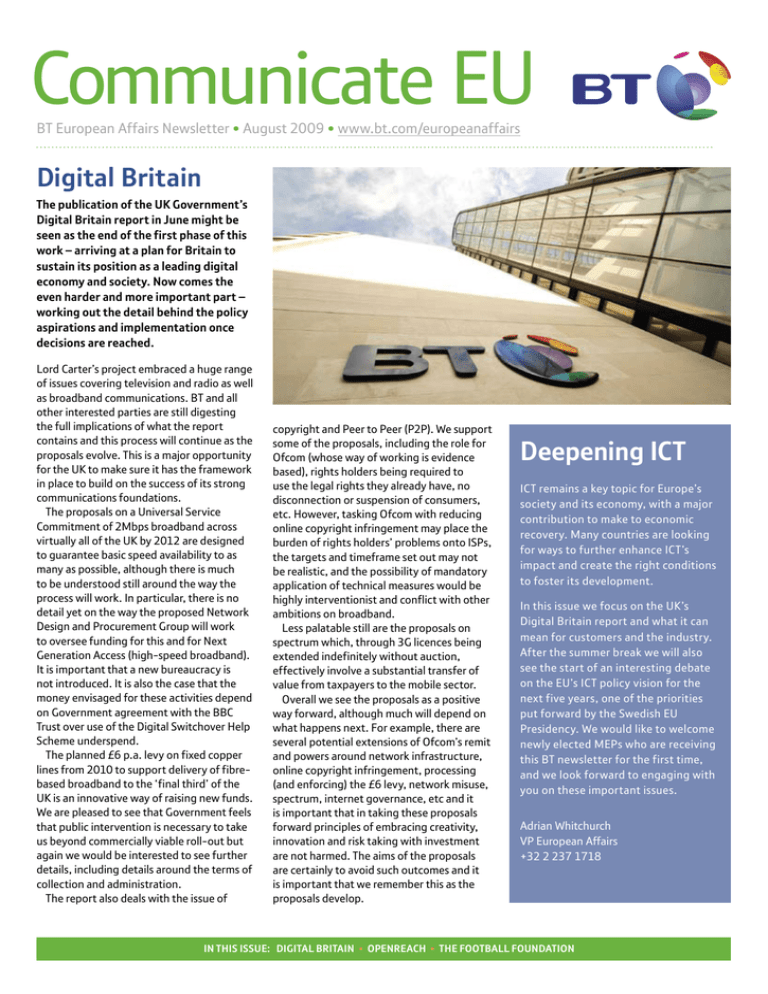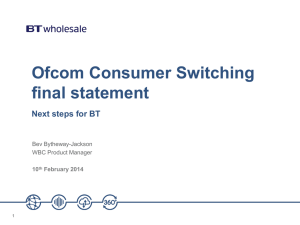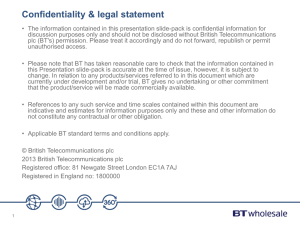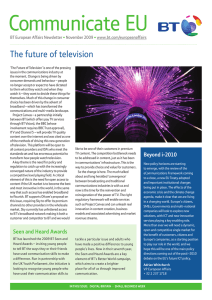Communicate EU Digital Britain
advertisement

Communicate EU BT European Affairs Newsletter • August 2009 • www.bt.com/europeanaffairs Digital Britain The publication of the UK Government’s Digital Britain report in June might be seen as the end of the first phase of this work – arriving at a plan for Britain to sustain its position as a leading digital economy and society. Now comes the even harder and more important part – working out the detail behind the policy aspirations and implementation once decisions are reached. Lord Carter’s project embraced a huge range of issues covering television and radio as well as broadband communications. BT and all other interested parties are still digesting the full implications of what the report contains and this process will continue as the proposals evolve. This is a major opportunity for the UK to make sure it has the framework in place to build on the success of its strong communications foundations. The proposals on a Universal Service Commitment of 2Mbps broadband across virtually all of the UK by 2012 are designed to guarantee basic speed availability to as many as possible, although there is much to be understood still around the way the process will work. In particular, there is no detail yet on the way the proposed Network Design and Procurement Group will work to oversee funding for this and for Next Generation Access (high-speed broadband). It is important that a new bureaucracy is not introduced. It is also the case that the money envisaged for these activities depend on Government agreement with the BBC Trust over use of the Digital Switchover Help Scheme underspend. The planned £6 p.a. levy on fixed copper lines from 2010 to support delivery of fibrebased broadband to the ‘final third’ of the UK is an innovative way of raising new funds. We are pleased to see that Government feels that public intervention is necessary to take us beyond commercially viable roll-out but again we would be interested to see further details, including details around the terms of collection and administration. The report also deals with the issue of copyright and Peer to Peer (P2P). We support some of the proposals, including the role for Ofcom (whose way of working is evidence based), rights holders being required to use the legal rights they already have, no disconnection or suspension of consumers, etc. However, tasking Ofcom with reducing online copyright infringement may place the burden of rights holders’ problems onto ISPs, the targets and timeframe set out may not be realistic, and the possibility of mandatory application of technical measures would be highly interventionist and conflict with other ambitions on broadband. Less palatable still are the proposals on spectrum which, through 3G licences being extended indefinitely without auction, effectively involve a substantial transfer of value from taxpayers to the mobile sector. Overall we see the proposals as a positive way forward, although much will depend on what happens next. For example, there are several potential extensions of Ofcom’s remit and powers around network infrastructure, online copyright infringement, processing (and enforcing) the £6 levy, network misuse, spectrum, internet governance, etc and it is important that in taking these proposals forward principles of embracing creativity, innovation and risk taking with investment are not harmed. The aims of the proposals are certainly to avoid such outcomes and it is important that we remember this as the proposals develop. Deepening ICT ICT remains a key topic for Europe’s society and its economy, with a major contribution to make to economic recovery. Many countries are looking for ways to further enhance ICT’s impact and create the right conditions to foster its development. In this issue we focus on the UK’s Digital Britain report and what it can mean for customers and the industry. After the summer break we will also see the start of an interesting debate on the EU’s ICT policy vision for the next five years, one of the priorities put forward by the Swedish EU Presidency. We would like to welcome newly elected MEPs who are receiving this BT newsletter for the first time, and we look forward to engaging with you on these important issues. Adrian Whitchurch VP European Affairs +32 2 237 1718 IN THIS ISSUE: DIGITAL BRITAIN • OPENREACH • THE FOOTBALL FOUNDATION BT European Affairs Newsletter • August 2009 • www.bt.com/european affairs Current issues for customers Lowering mobile termination rates BT has joined forces with mobile operator 3 UK and other partners to launch a campaign calling for a significant cut in the cost of calling mobile phones. The Terminate the Rate campaign is calling for an end to high mobile termination rates (MTRs), the fees charged by one operator to another for connecting a call to another network. As well as BT and 3 UK, other partners include the Federation of Small Businesses, Carers UK, the National Union of Students and the GMB, as well as a number of Local Authorities. Terminate the Rate is aiming to bring down MTRs to around a penny or less, saving consumers and businesses hundreds of millions of pounds. The European Commission has recognised that high MTRs penalise consumers and stifle competition and has recommended that national regulators like Ofcom take a new approach to setting MTRs to bring them down to reasonable levels. The campaign is calling on Ofcom, who are currently reviewing MTRs, to implement changes to drive down the cost of MTRs promptly. Consumers and businesses are being asked to register their support for the campaign at www.terminatetherate.org and Early Day Motion 1531, calling on Ofcom to lower Mobile Termination rates, has been signed by over 140 MPs. The BT Business Experience BT Business organised the UK’s largest free small-business event, the BT Business Experience 2009, as part of its support for small businesses. The event, which took place in London at the end of June, brought together a host of business organisations, technology experts and entrepreneurs to advise the nation’s small businesses on how they can continue to survive and thrive in the current downturn. Businesses were given the opportunity to try out the very latest in office-based, home-based and mobile technology for businesses and expert advisers were on hand to answer questions. Downloadable fact sheets and an online tour of the experience for small businesses who missed the event are available at www.btbusinessexperience.com The event is part of a wider range of initiatives from BT Business to help small businesses in the economic downturn. From 19 to 23 October this year, BT Business will be hosting its annual Small Business Week with a range of partners. BT and inclusive communications BT launches www.textrelay.org BT has launched www.textrelay.org, a one-stop shop for text communication. It provides information about the text-relay service, which enables deaf, hard of hearing and speech-impaired people to communicate with family, friends and businesses. Text Relay offers direct-dial calls between textphones using the BT text platform as well as access to relay assistants who provide a speech-to-text/text-to-speech relay service linking people with hearing and speech impairments to individuals and businesses without text phones. UK’s cheapest broadband announced Plusnet (www.plus.net), an independent subsidiary of BT, has launched Plusnet Value, the UK’s cheapest stand-alone broadband. For a standard rate of £5.99 a month, Plusnet Value customers get up to 8Mb speeds, a wireless router, 24/7 award-winning support and a monthly usage allowance of up to 10Gb, with no connection charge. As part of its commitment to digital inclusion, BT has also ensured that customers on BT Basic, BT’s social telephony scheme, can order broadband on their subsidised line from any Internet Service Provider of their choice. BT welcomes pay TV consultation BT has welcomed the latest Ofcom consultation proposing remedies for distortions in the pay TV market. This follows on from Ofcom’s conclusion that Sky is dominant in wholesale Core Premium Sports Channels and Core Premium Movie Channels markets and that competition and innovation have suffered as result of this market power. The final outcome will impact on every consumer who would like to have access to premium sports or movie channels, a choice of suppliers and lower prices. BT, which offers pay TV services through BT Vision, believes that the pay TV market is structurally flawed because competitors cannot outbid Sky for key content. As a result, customers are paying too much and have too little choice. BT is supporting Ofcom’s proposal to require Sky to offer its premium channels to other providers in the wholesale market, so that they can enter the pay TV market and provide customer choice. We also believe it is very important that Ofcom makes a full set of channels available and Ofcom sets clear prices for these channels as there will be no new competition if Sky can price the channels to keep out competitors and if only a few channels are made available. BT continues to invest in building the most competitive communications market in the world by opening up its network to competition. Sky has ‘unfettered’ access to this network whereas BT and other competitors are ‘locked out’ of Sky’s own network. BT wants a level playing field of regulation in which we give open access to our network and we and others can for the first time get fair access to premium channels. BT European Affairs Newsletter • August 2009 • www.bt.com/european affairs Focus on Steve Robertson, CEO, Openreach Steve Robertson was appointed Chief Executive of Openreach upon its creation in 2005. Steve previously held senior positions across BT Group and at COLT Telecommunications. Steve became the first CEO of Openreach, following the conclusion of Ofcom’s Strategic Review of Telecommunications. As part of its undertakings to Ofcom, BT agreed to set up a functionally separate division to manage the UK’s access network (otherwise known as the local loop; the copper and fibre lines linking homes and businesses to their local exchange). This division, Openreach, was launched in January 2006, with the mandate to supply all communication providers, including BT’s own Retail and Wholesale divisions, with fair and equivalent access to the local loop. All communications providers now enjoy equal use of the UK’s access network, monitored by an independent ‘Equality of Access Board’. As a result, the UK now has one of the most vibrant and competitive telecommunications markets in the world, with obvious benefits to consumers in terms of cheaper prices and increased choice. Steve is genuinely passionate and enthusiastic about the market role Openreach plays, “In the three years since its creation, Openreach has firmly established itself as the backbone of the UK’s telecommunications industry, carrying the calls and internet connections of over 300 million people every day, on behalf of a vibrant market of over 420 communications providers. Our customers range from large players such as Carphone Warehouse, to smaller niche or local operations” he said. Steve is proud of the way Openreach has focussed on improvements to the network infrastructure and thereby dramatically lowering the number of network faults, “99.94% of lines are now functional at any given time, and a typical end user experiences a fault only once every 13 years” said Steve. Looking ahead, Steve says that Openreach is committed to delivering on next-generation broadband, “In 2008, BT committed to spend £1.5bn on deploying super-fast fibre broadband to over 10m households, covering 40% of the UK’s population, by 2012”. And Steve is determined to see the competitive market maintained in this new era, adding, “Openreach will be making this new network available at a wholesale level to all other Communications Providers, ensuring that the entire UK communications industry can offer new and exciting services across Openreach’s super-fast fibre access network, the first sites of which go live this summer.” The UK already benefits from the highest broadband availability in the G8. Over 99% of homes have access to broadband services, largely due to the national reach of Openreach’s network, which has the ability to provide a far more stable and full-featured service than alternative technologies such as satellite or mobile broadband. This connectivity is available to a wide range of alternative providers, which provides crucial customer choice. However, take-up has been traditionally limited by computer ownership. Steve argues that with the increasing sophistication of networked devices such as TVs, the traditional view of broadband as something to be accessed via a computer will change completely. According to Steve, “The high-water mark of the broadband market will not be who has got a computer, it will be who has a TV.” At the same time, Steve is keen to engage in the current debate on Digital Britain and the Conservatives’ Creative Industries Review, “This is a unique opportunity for the UK to build on the success of the current communications infrastructure. Proposals that recognise public intervention are necessary to take us beyond commercially viable rollout. We look forward to working with policy makers across the political spectrum to ensure the UK maintains its leading role in communications to enable its future competitiveness.” Openreach is certainly going to continue to play a significant role for UK investment and infrastructure in the years ahead. BT – Global round-up BT has signed a five-year contract with Emirates Airline to help the leading international airline consolidate its contact centres around the world onto a single, globally managed platform. The new virtualised infrastructure will link up seven major contact centres based in Manchester, New York, Melbourne, Mumbai and Dubai and enable the airline to provide a host of new services to its passengers and agents as well as improving efficiency. BT has signed an agreement to connect global offices of Nestlé, a leading global nutrition, health and wellness company, using the next-generation high-end video conferencing services. BT will deliver to Nestlé a fully managed video conferencing service. The solution, which will initially connect Nestlé’s global hubs, uses high-definition video and multidimensional sound to offer a high quality videoconferencing experience. BT has signed a strategic agreement with the KCOM Group – a leading provider of communications solutions to businesses and public sector organisations throughout the UK. The agreement will enable KCOM to extend its network reach through access to BT’s national network, outsourcing the management of its network assets to BT’s wholesale division and to benefit from BT’s ongoing investments in a 21st-century network infrastructure and next generation product and service developments. BT European Affairs Newsletter • August 2009 • www.bt.com/european affairs BT and the Football Foundation expands to a further 20 centres BT and the Football Foundation have announced a further 20 Communicating for Success (CfS) programmes which are being rolled out in learning centres attached to Football Clubs across the country. The ‘Innovation Programmes’ will offer grants of £10,000 each and are targeted at four categories: transitioning from primary to secondary school; those at risk of falling into the NEET category, family learning; and over 55s. The new participating centres include Blackburn Rovers, Bolton, Colchester, Darlington, Hartlepool, Huddersfield, Leeds, Leyton Orient, Luton, Manchester United, Margate, MK Dons, Rotherham, Norwich City, Stoke, Southend United, Swindon, Tottenham Hotspur, Tranmere and Wembley. This latest initiative comes almost twothirds of the way through the programme, which has now reached over 1,600 participants. Tackling digital illiteracy is the priority and well in excess of 90% of participants have reported significant improvement in ICT skills. In addition, BT Vision has now launched the Communicating for Success Community Channel (965), which allows participants of the scheme to showcase their achievements on national TV. BT and UNICEF help bridge digital divide in China BT has launched a joint initiative with UNICEF which will bring modern technology to schools in poor rural areas of China to improve access to high quality education. BT is investing £500,000 (RMB5 million) to benefit up to 6,000 students and 1,700 teachers across four provinces – Qinghai, Ningxia, Yunnan and Jiangxi – where there are high levels of digital exclusion. Computers, internet access, multimedia projectors and other educational materials will be provided in up to 40 rural schools which are under-resourced and have severely limited access to modern teaching aids and equipment. Other activities as part of the initiative will include establishing an online learning community to help teachers learn from each other and to share teaching resources. Training in computer skills and how to develop innovative teaching methods using information technology will be provided to 40% of teachers in project schools. The initiative represents the third phase of BT and UNICEF’s Inspiring Young Minds programme, a £1.5 million global development partnership designed to bring education, technology and communication skills to children from disadvantaged backgrounds in South Africa, Brazil and China. BT launches 2009 sustainability report BT’s 2009 sustainability report has now been published. The report, ‘Changing world: Sustained values’ details BT’s progress against key sustainability targets and outlines why, despite tough economic conditions, the company is standing firmly behind its commitment to be a responsible and sustainable business. Key headlines from the report include: a 43% reduction in CO2 equivalent emissions intensity from 1997 baseline – good progress against the company’s 80% reduction target by 2020; 50% of waste from UK operations is now recycled, with 17% less of total UK waste going to landfill sites than in 2008; 50,000 tonnes of CO2 saved annually for BT customers through improved energy efficiency of its home-phone range; and the development of a sustainability framework embedded into the product development process and a low carbon opportunities map which has highlighted growth areas for the company. The report is available online at www.bt.com/betterworld How to contact us Adrian Whitchurch Till Kupfer VP Trade and International Affairs + 32 2 237 1713 tilmann.kupfer@bt.com Henk Mannekens European Regulatory Manager +32 2 237 1757 henk.mannekens@bt.com © British Telecommunications plc 2009. Registered office: 81 Newgate Street, London EC1A 7AJ. Registered in England No. 1800000.Produced by BT Group Communications. Designed by Tag. Printed on recycled paper.


